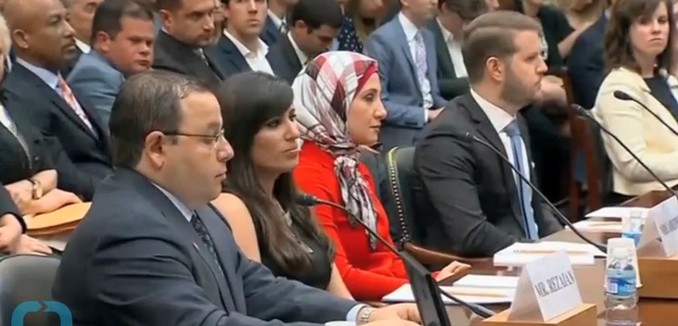Relatives of Americans jailed by Iran testified before the House Foreign Affairs Committee Tuesday about the ordeals of their loved ones.
As The New York Times reported:
It was the first time that the relatives of all four Americans — Amir Hekmati, 31, Saeed Abedini, 34, Jason Rezaian, 39, and Robert A. Levinson, 67 — appeared together, in the hearing room of the House Foreign Affairs Committee, to publicly share their anguish and frustration over what they described as Iran’s illegal seizure of their loved ones. They said their family members had committed no crimes and were essentially political prisoners and hostages. …
While the fates of the three Americans imprisoned now and of the fourth, who is missing, are not part of the nuclear negotiations, lawmakers have increasingly framed these cases as barometers of Iran’s trustworthiness in honoring its international pledges. “If top Iranian officials cannot be counted on to assist these wrongfully jailed Americans, can they be counted on to honor the commitments they make at the negotiating table?” asked Representative Ed Royce, Republican of California and chairman of the committee. …
Some of the most poignant testimony was from Mr. Hekmati’s sister, Sarah, who recounted how he had first visited his family’s ancestral homeland in August 2011, having been reassured by Iranian officials that his Marine Corps service was not an issue. He was seized by Iranian intelligence agents, detained without his family’s knowledge, tortured, convicted of espionage and sentenced to death, Ms. Hekmati said. The punishment was reduced to 10 years in prison at a secret trial he did not even know about, she said.
In April, Hekmati, a former Marine, described the jailing of Americans by Iran as “serial hostage taking.”
Iran views Hekmati, Abedini, and Rezaian as Iranian citizens, and that their arrests are therefore an “internal matter.” Iran claims to have no idea of the whereabouts of Levinson, a former FBI agent.
At the hearing yesterday, Rep. Dan Kildee (D – Mich.) spoke about the strong bipartisan support for his resolution calling on Iran to release the three Americans known to be jailed, as well as provide information about any Americans who have disappeared in Iranian territory.
My bipartisan resolution calls for the immediate release of Amir Hekmati and the other Americans being held as political prisoners in Iran. The bipartisan support H. Res 233 has received in a few short weeks has been incredible – over 160 members, Democrats and Republicans, including Chairman Royce, Ranking Member Engel, and the majority of members on this committee. I am deeply grateful to my colleagues who have supported this important resolution and who continue raise attention to Amir and the other Americans being held in Iran.
It is important that through this resolution, Congress speaks with one voice regarding Amir and the other Americans being held by Iran. A strong, bipartisan voice that sets aside partisan differences we may have in Congress and demonstrates to Iran that we are united in our efforts to bring them home. Iran cannot hold American prisoners like Amir Hekmati if it wants to be taken seriously by the global community. …
However, it is important to recognize that the freedoms of these innocent Americans should not be inserted into the nuclear deal. The freedom of Amir and the other Americans should never be exchanged for provisions of any nuclear agreement. We never want to be in a position where we are offering concessions regarding Iran’s nuclear capabilities or economic sanctions in return for the freedom of innocent Americans. Amir himself has said he does not want to be exchanged as part of the deal. The release of Amir and the other American prisoners should be unilateral and separate of any agreement. If Iran wants to be taken seriously in the global community, Iran has to realize that it cannot hold political prisoners like Amir Hekmati.
Kildee introduced his resolution at the beginning of May.
The trial of Rezaian, who was arrested last July, started last week. An editorial in The Washington Post condemning the incarceration of the reporter, and raised the question of how the regime can be “expected to deliver on commitments they make with respect to the nuclear program” when it can’t or won’t help Rezaian. Another editorial raised the concern that if a reporter could be arrested without cause, a nuclear inspector could suffer the same fate.
[Photo: wochit News / YouTube ]




